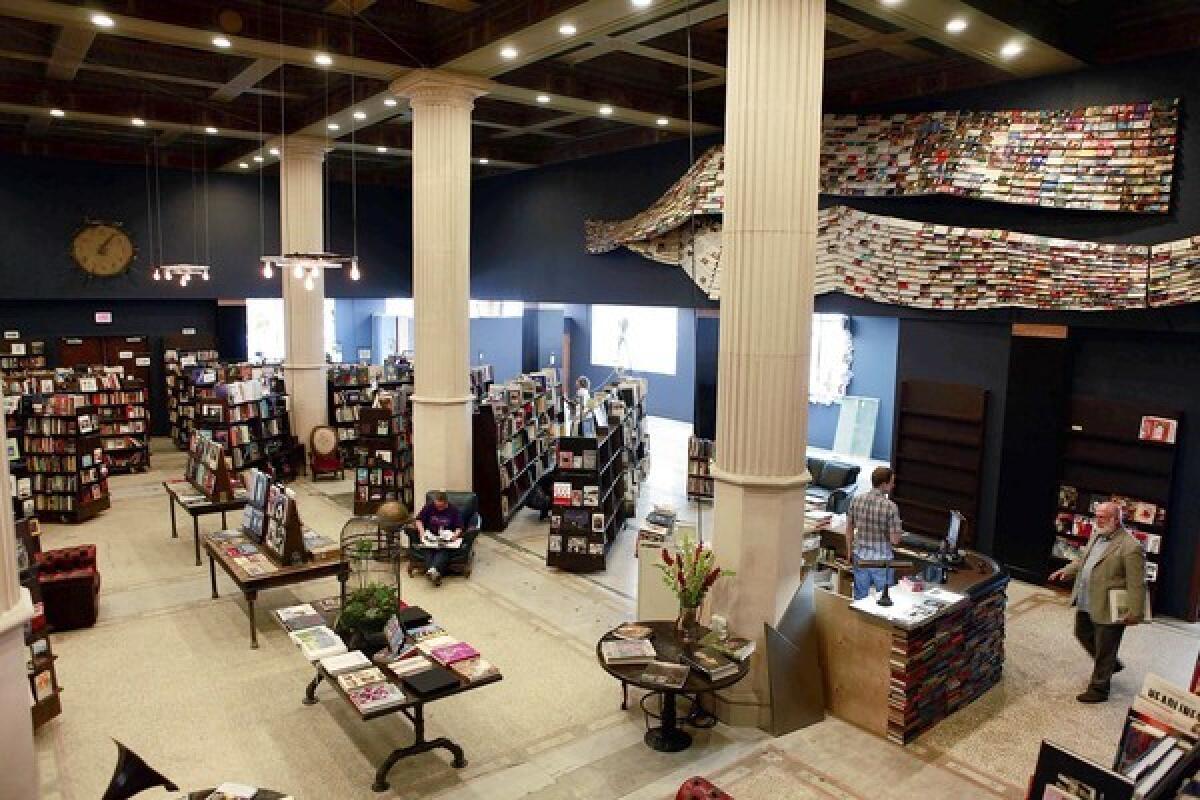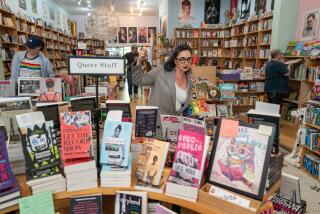Downtown L.A.’s the Last Bookstore defies trends

Before launching a business, some people invest in market research and feasibility studies. Josh Spencer is not one of those people — otherwise he might never have opened his downtown L.A. used bookstore in December 2009, let alone moved it a few blocks away this month to a 10,000-square-foot space.
“I haven’t really interacted with other business owners or bookstore owners,” says Spencer, owner of what he says is the ironically named the Last Bookstore. “I’ve always just done what I do, and it seems to work.”
Following his instincts means going against the grain. This month, two longtime Southern California bookstores — one in Laguna Beach and another in Pacific Palisades — announced they’ll be closing, and Metropolis Books in downtown L.A. was put up for sale by its owner. In February, Borders filed for Chapter 11 bankruptcy, closing hundreds of stores nationwide. After waves of closures, many have wondered if brick-and-mortar bookstores can survive Amazon and e-books.
Located on the ground floor of the Spring Arts Tower downtown, the Last Bookstore is a mix of old and new. It has pillars stretching 25 feet up to a painted, vaulted ceiling; underfoot are intermittent mosaics, all part of the former Citizens National Bank, which opened in its grand location in 1915. The light fixtures are new, created from bicycle wheels by Brad Goldhorn, and high on the south wall flows a sculpture made of wire and old paperbacks created by Mike Piscitello, a student at SCI-Arc.
Tucked under wheel-equipped bookshelves is a new, low stage where bands perform regularly. One of the 15 people who works for Spencer books bands; theater events are also coming up and, Spencer hopes, films. “My dream was to create one giant space where everything I thought was cool would be in one place,” he says. “Hopefully, other people will come in and share it with me.”
The space got a new coat of paint with the help of family and friends. “There’s not a lot of money that went into any of this,” Spencer says. “It was just people working hard, doing what they love, to make something great happen.”
Scratch under the old style and the dark stain and some bookshelves might look familiar; several of them came from a closing Borders store in Glendale. “We scavenged the bones of the corporate giant,” Spencer admits.
Spaces in the Spring Arts Tower typically rent for $1.50 to $1.80 per square foot, but Spencer got a deal when he signed a three-year lease on the space. The corner at 5th and Spring, though at the center of downtown’s art district and home to destinations like the Gorbals restaurant, has remained gritty. At 12:20 p.m. on May 10, as people were getting the Last Boosktore space into shape, a suspected drug dealer was killed by an undercover LAPD officer just across the street.
“There’s a slight element of danger,” Spencer admits. “I like that it’s real, that there’s an intersection of downtown’s past, downtown’s future and present. People at all different places in life, people who are criminals, people who are in city government, people who are artists — it’s all together. I think that’s vibrant and essential, and I think that’s why so many people are moving downtown.”
Of course, many book buyers have moved online, and that’s where Spencer started too, selling furniture, music and cars. Books, he decided, were easier to manage, and he’s continued to house books in a nearby warehouse while selling online. But six months ago, for the first time, bookstore sales overtook online sales. And that was when the Last Bookstore was located in a 1,000-square-foot space on Main Street.
“We sold more books here in the first three days than we did in an entire month at our last location,” Spencer says. “It seems to be working, by having a larger space and being on Spring Street, a much heavier foot-traffic area.”
Trying to remake the idea of the used bookstore with dusty, ancient stock, Spencer’s staff gets fresh books into circulation daily — hundreds of books a day, he says. Currently the store has a bounty of art books, many from a single collector. Priced to sell — hardcover fiction averages about $5 — books move quickly. Those that don’t wind up in the $1 bargain zone in the entryway, and then donated elsewhere.
“I think books are going to become sort of like vinyl is now: the province of people who appreciate things that are well made, appreciate craft in graphics and creativity they can feel,” Spencer, 36, says. “I think there’s always going to be a great market for books, but it’s definitely going to shrink to those who value and enjoy the ritual of browsing through books and holding books and turning pages. That’s gradually going to become less and less, as the generations pass. This might be the last generation, I think.”
Making the name of his store not so ironic after all.
More to Read
Sign up for our Book Club newsletter
Get the latest news, events and more from the Los Angeles Times Book Club, and help us get L.A. reading and talking.
You may occasionally receive promotional content from the Los Angeles Times.









